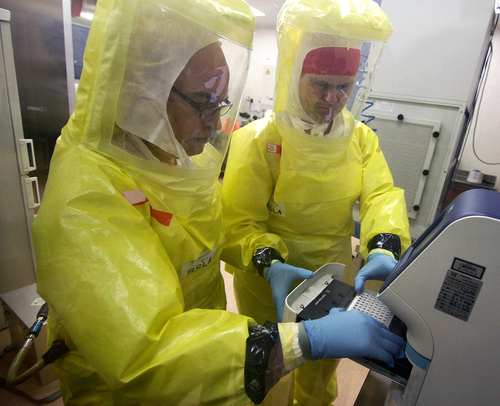
Leadership from the Alliance for Biosecurity urged Congressional lawmakers at a hearing on Thursday to increase funding for programs to protect Americans from biological and chemical threats.
Speaking before the House Appropriations Subcommittee on Labor, Health and Human Services, and Education, Alliance for Biosecurity Co-Chair Chris Frech said consistent funding for these biodefense programs is critical to ensure the United States has the diagnostics, therapeutics and vaccines to deploy in the event of a public health emergency.
Specifically, the Alliance calls for allocating $954 million to the U.S. Department of Health and Human Services’ (HHS) Biomedical Advanced Research and Development Authority (BARDA). It also calls for the funding of $800 million for HHS’ Project BioShield Special Reserve Fund; $632 million for pandemic flu preparedness; and $668 million for the Strategic National Stockpile.
“The Alliance for Biosecurity is a leading industry voice on biosecurity issues and is committed to building and strengthening the partnerships between government and industry to provide solutions to the threats facing our nation,” Frech told committee chair U.S. Rep. Tom Cole (R-OK) and ranking member Rep. Rosa DeLauro (D-CT). “It has long been recognized that the government can’t do this work alone. An effective and highly functioning public-private partnership is the best way to prepare,” he said.
The Alliance, a coalition of biopharmaceutical companies and laboratory/academic partners, advocates for public policies and funding to support rapid development, production, stockpiling, and distribution of critically needed medical countermeasures.
Frech thanked the committee, which is currently discussing appropriations for fiscal year 2019, for its recent support for increasing funding for the Project BioShield Special Reserve Fund, the Strategic National Stockpile, pandemic flu programs, and BARDA above fiscal year 2018 levels.
He pointed out that the funding is necessary to fight the 12 material threat assessments identified by the Department of Homeland Security that could impact the United States. Among these threats are infectious diseases like avian flu, Ebola, Zika, and other pandemic influenzas. Also, the threat of intentional chemical, biological, radiological, and nuclear attacks are real, Frech added, citing recent white powder incidents and the use of chemical weapons in places like Syria. He said the U.S. must be prepared to respond to all these possibilities.
“The Alliance members share strong commitment in improving our national security as willing partners with the government,” Frech said. “The committee understands that drug and vaccine development is costly, risky and time consuming. it often takes a decade and up to $2 billion to develop a new product. A commercial market for these medical countermeasures does not exist. Private sector partners rely on consistent and predictable government funding to facilitate future planning and maintain momentum in the development of these critically needed medical countermeasures,” Frech explained.
A new survey conducted by the Alliance found that most Americans support increased federal funding to address biosecurity threats. Specifically, 73 percent said they would have a favorable reaction “if Congress decided to increase the budget this year for developing preventive measures for biological and chemical threats.”
Further, 52 percent said they are more likely to support their elected representative if he or she is “actively engaged in promoting and supporting biosecurity.” Also, 52 percent said they would be less likely to re-elect someone who voted against providing additional funding for biosecurity programs. However, only 31 percent of Americans said they were confident that the government is prepared to handle a biosecurity threat, down from 50 percent in March 2016. The survey polled 1,612 likely voters.
“Public-private partnerships of this nature are effective because they are based on open dialogue about evolving needs and issues. Members of the Alliance for Biosecurity look forward to continuing collaboration and open communication to ensure that our nation’s public response network, therapeutics, and vaccines are available to protect the public in a public health emergency,” Frech concluded.
Reps. Cole and DeLauro shared Frech’s view about the importance of funding these programs.
“It’s not a question of when these things, or if these things are going to happen – they’re going to happen,” Cole said. “The biosphere is going to throw things at us. We’re going to see natural disasters. You would hope we never see a bioterrorism event but if you look around the world, we actually see people participating in those sorts of things right now so to not be prepared, to me, is penny wise and pound foolish.”




